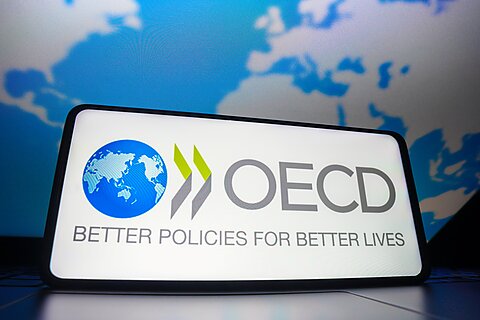Adam N. Michel
The OECD has been working with European countries and the Biden administration to rewrite the rules that govern how international businesses are taxed on their global profits. This sprawling effort is made up of two pillars, which, taken together, threaten higher and more complicated taxes on global businesses. I’ve written about the costs and consequences of Pillar Two here, here, and here.
Pillar One aims to redistribute $205 billion of multinational corporate profits to countries based on customer location, regardless of a company’s physical location. Like Pillar Two, Pillar One primarily targets America’s more profitable firms.
Pillar One’s chief selling point, as told by OECD officials and the US Treasury, is that it will fix the instability caused by unilateral digital services taxes (DSTs) and other similar measures aimed at adding a second layer of tax on primarily US‐based online service providers. The OECD’s recently released Pillar One Multilateral Convention (MLC) draft and explanatory documents (encompassing over 900 pages) show how it could further destabilize the international tax system and fail to eliminate DSTs.
Background
The current international tax system generally distributes corporate profits based on where those profits are generated, usually aligned with physical production, employees, or intellectual property. Pillar One turns this paradigm upside down. So‐called Amount A of Pillar One siphons off a portion of these profits and redistributes them based on where customers are located, irrespective of the company’s physical presence. The new rules apply to companies with more than €20 billion in revenues (falling to €10 billion after seven years) and a global profit margin above 10 percent.
Amount A is intended to replace a patchwork of DSTs, which some countries have begun implementing based on revenue from local users. In July 2023, some countries agreed to freeze the implementation of their DSTs for one year while Pillar One negotiations progressed.
For the MLC to take effect, at least 30 jurisdictions, making up 60 percent of in‐scope multinationals (assigned via a point system), must sign the agreement. This threshold requires US adoption by gaining two‐thirds support in the Senate, a tall order in the current political environment.
Pillar One’s Arbitrary Profit Reallocation
Amount A introduces a series of new and arbitrary formulas and thresholds to allocate taxing rights toward seemingly political ends. The new tax introduces unpredictability and new political incentives into a system previously governed by understood norms.
One central aspect of this arbitrariness is the criteria defining which businesses fall within the scope of the new rules. The chosen thresholds, based on profit margins and annual revenues, are not rooted in a new or consistent theory of taxation; they are chosen out of political convenience to maintain consensus and target certain types of firms, such as US‐based technology firms.
This political ambiguity extends to the treatment of newly defined “tail‐end revenues”—those that firms could not trace to a specific consumer location. The OECD plan would allocate these revenues to lower‐income countries. This redistribution based on development level adds a vaguely defined element of “global need” to the growing list of ways the OECD wants to allocate corporate profits (i.e., customer location and value creation).
Moreover, the MLC’s approach to specific industries raises questions. It pointedly exempts extractive sectors such as mining and oil, although these industries, like digital companies, often separate their operational jurisdictions from the locations of their end consumers. The policy is instead aligned with targeting specific business models, adding another layer of complexity and subjectivity to the proposed international tax law. If policymakers think a new tax is necessary, it should be applied equally.
Without the protection of norms around physical presence and value creation, there is no logical end to how best to divvy up corporate income among the 140 countries that have signed up for the OECD project. Thus, Pillar One invites a future where tax regulations are constantly in flux, driven by ever‐changing political landscapes and threats of unilateral action.
Pillar One Does Not Eliminate Digital Services Taxes
The Pillar One proposal was initially advanced as a solution for unilateral DSTs. Instead, the MLC may actually encourage similar unilateral actions in the future.
In 2019, France and a handful of other primarily European countries enacted or proposed DSTs targeting prominent US technology firms. In response to the French proposal, President Trump threatened tariffs on French exports, and the DST‐implementing countries used the resulting risk of escalating retaliatory tax and trade measures to move the OECD international tax rewrite forward.
The MLC lists nine DSTs and similar measures meant to be replaced by Pillar One and outlines prohibited activities that resemble these taxes. Notably, the rules are written so countries can adopt Pillar One to capitalize on the redistributed tax revenues or continue with their domestic DST. For example, Canada will decide if their projected $1 billion a year in DST revenue will exceed their share of revenue from the Pillar One allocation. Countries with the most aggressive unilateral taxes will have the smallest incentives to join the agreement.
Furthermore, entrepreneurial countries may be able to reform some of the most discriminatory features of their DSTs so as not to trip the specific OECD Pillar One definition. In doing so, countries with carefully designed out‐of‐scope digital taxes could raise revenue with novel unilateral measures and still benefit from Pillar One’s allocation.
Conclusion
While lengthy and complex with many additional specific problems, the fundamental flaw in Pillar One is conceptual. The rules will not fully replace DSTs while creating new forms of unpredictability in their wake. It is more apparent than ever that the OECD’s proposal will only add to the political disagreements over the international tax system, making them worse.

